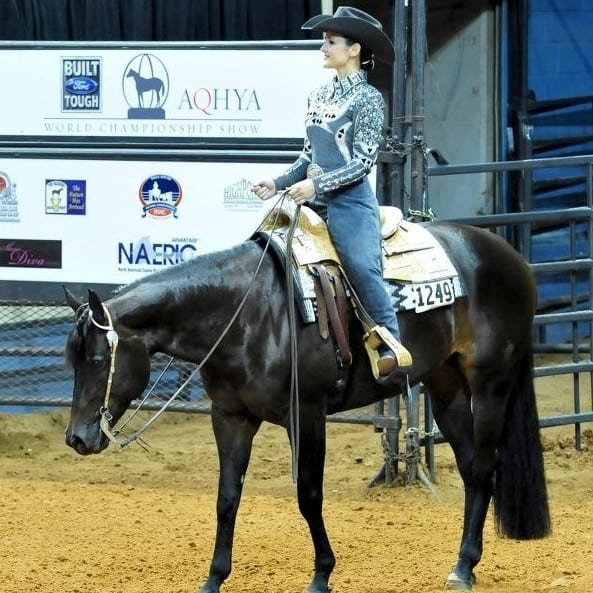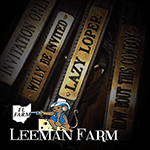Do you nail every maneuver at home, never missing a distance, practice with perfection every stop, turn and change of lead only to get to the horse show and forget your pattern? If horse shows make you so nervous you wish you could just video your ride at home and send it in to be judged, here are a few tips borrowed from the field of sports psychology to help you gain control over show ring jitters.
Sports psychologists describe competitive stress as the negative reaction that occurs during a competition that leads to apprehension, loss of confidence, tension, and an inability to concentrate. If any of the preceding words describe how you feel when you get into the show pen don’t worry, you are not alone.
Perhaps the best way to start gaining control over your nerves is to explore the nature of competitive pressure, in our case, horse show nerves. Experts agree that pressure is not something that happens; rather it is something we create. A horse show, in and of itself, does not cause stress. Competitive pressure occurs as a result of our assessment of the situation and the tools we have available to deal with the situation, the meaning of the consequences and and our coping mechanisms.
It is only after you make a mental appraisal of the competition and your resources – horse’s ability, skills and time in the saddle – that you then succumb to pressure. Your perception of the situation is what gives meaning to the event – stress-laden horse show or exciting opportunity to test your skills with your horse. The good news is because competitive pressure is something we create, it is therefore something we can change.
What causes pressure? It is often helpful to first determine where the pressure comes from. Some common causes are:
- Expectations from family, coaches and other competitors
- Expectations placed on yourself
- Importance of a particular event
- Your readiness to perform, amount of time spent in practice, knowledge of event, etc.
- New horse, technique, trainer or class
- Other events in your life that affect your preparedness
- Lack of confidence
- Repeated errors in the show pen
After determining your greatest cause of show-ring pressure, practice under those circumstances which typically cause stress. Gather a group to ride with at home and practice passing, invite people to watch, use a loudspeaker or have a mock horse show. Practice hard at home and practice like you will show with show tack, show posture, etc. Start with smaller shows and increase the level of competition with each outing. Put yourself in situations that trigger pressure at home and develop a level of comfort and techniques to deal with potentially threatening situations – think second grade fire drill.
Competitive pressure is based on the way we interpret the competition and the way we think or describe the situation in our mind. It occurs because of a perceived imbalance between the demands of the horse show and the resources available to the exhibitor to cope with the demands of competition.
Increasing your resources is key to making pressure your friend. Here are some tips to increase your ability to cope by adding techniques to your tool belt.
- Understand how the competition works. Know the rules, understand the criteria judges use to score the class, learn what judges are looking for and realize that judges’ scores are not personal, but a record of your progress that day.
- Control the things you can control. You only have influence over how you respond to events as they unfold. You do not have control over external happenings; the show running early, the show running late, a horse spooking in front of you, etc. You do have control over your readiness, the distance you keep from other horses, and the thoughts that run through your mind.
- Learn from your mistakes. Experience is a great teacher. Rather than shifting blame for the results or assuming you are not capable, recall the things you did correctly, acknowledge the responses that were incorrect and design a program at home to improve your responses. Knowledge is power.
- Look where you want to go. Think about the gopher hole in the field – you stare at it in order to avoid it yet your horse steps directly into the trap. Envision your perfect ride, control your self-talk and do not let your thoughts stray from the positive plan you set before entering the show pen. The words you speak to yourself have meaning. Practice positive self-talk.
- Force a smile. Studies have proven that forcing yourself to smile will elevate positive feelings and self worth. Even if only for a second, a smile could change your attitude enough to take the stiffness out of your performance. The same goes for your posture, stand or sit tall, take a deep breath and let your posture stimulate confidence.
- Focus on the task at hand not the outcome. Put in your best performance and let the score take care of itself. Stay in the present – avoid thinking about the win. Focus on the right things at the right time. Break down the elements of your performance necessary to have a great ride – great rides always find their way to the winner’s circle.
- Create if-then scenarios. This means if you feel your horse’s legs getting quick, you are going to sit back; if you feel your horse tensing as you walk to the cone, you are going to take a deep breath and close your legs; if the judges ask for the canter out of the trot you are going to post five times before asking for the canter. Define your ideal response for the situations that create tension then follow the plan.
- Show as if you don’t care if you win or lose. Pressure escalates the more you care about the outcome. An open or local show has the same procedures as the World Show; you still have to jump eight jumps, you still have to stop and set up for inspection, you still have to reverse and lope off – same strategy, same rules and same game. Have fun – show as if you don’t care how you place and you may relax enough to put in that great ride you know you are capable of.
Just like getting out of the horse’s way is the hardest part of being a great horse trainer, not interfering with your abilities is the most difficult part of controlling competitive pressures. Professional athletes do not let their minds work against them. Instead they accept performance anxiety as part of the competitive experience and make it work for them.
You must increase your personal resources to face the demands of the show ring. Those include self-confidence, the belief that you can succeed; an understanding of how much is under your control and a positive approach to do your best not to avoid making mistakes.
The most competitive individuals have the highest level of self-confidence before they enter a competition. They perceive their performance as being under their control – they believe they own their destiny. Lastly, they stay focused on what they can achieve not the mistakes they could make.
Modify the way you think about horse shows to develop the mental toughness necessary to perform at high levels despite obstacles or adversity. Once you learn to control your response to the situation, you will learn to take the pressure in stride and eventually to use the exhilaration of competition to your advantage.
Your greatest enemy exists in the negative thought process you allow in your mind. If you believe you can, you will and if you believe you cannot, you will not. Practice relaxation techniques, breath deeply and often. Practice psyching yourself up, learn how to motivate yourself and practice positive self-encouragement.
As NFL Hall of Fame player Roger Staubach once said, “The thing that distinguishes athletes is the ability to do well in times of great stress, urgency and pressure.” It is a distinction worth noting and one that becomes abundantly clear in the show pen. Those with steely nerves ride through potential ruins as if it was part of the plan leaving spectators unaware that a possibility for disaster ever existed.
Hopefully you show because you love horses and are dedicated to becoming a great horseman. Practice the strategies above or develop your own rituals and routines. With practice, you can learn to keep your cool, embrace the excitement that comes from showing, thrive under pressure and create great rides.







